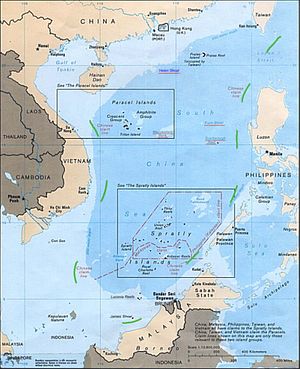Adrien Morin contends that China’s foreign policy is consistently non-assertive toward Western power, basing this on its policy throughout the Syrian crises. While Mr. Morin’s thesis on consistency may find support in China’s position on non-interventionism in Syria, it falls apart in his attempted extrapolation to the South China Sea.
Despite any perception within China that its policy in the South China Sea is not “foreign policy,” it is – not because the territory and water in dispute are decidedly international, but because the disputes at issue involve multiple sovereign state actors and must be navigated through diplomacy. China’s own practice of acceding to multilateral and bilateral agreements pertaining to the South China Sea confirms this fact – why would China conclude international agreements regarding an area to which it genuinely believed it had perfect title?
In fact, the common refrain from China on the best course of action to resolve territorial and maritime disputes in the South China Sea has been a foreign policy tool, namely bilateralism. This is China’s explanation for its refusal to participate in arbitration with the Philippines before the Permanent Court of Arbitration. Similarly, it is the stated basis for China’s continued reluctance to resolve a Code of Conduct in the South China Sea with ASEAN.
So, China has a consistent foreign policy of bilateralism in the South China Sea, right? Wrong. When it comes to the South China Sea, and where Mr. Morin goes astray, China’s foreign policy in practice diverges greatly from its stated policy. In practice, Chinese foreign policy has been anything but consistent and has included aspects of multilateralism, bilateralism, and (most recently) unilateralism, achieving an almost incomprehensible level of unpredictability.
In the multilateral context, China has demonstrated that it will accede to both binding and non-binding commitments with which it has no intention of complying. In 1996, China signed onto the U.N. Convention on the Law of the Sea (UNCLOS), yet continues to assert maritime claims that are wholly incongruent with that regime. In the non-binding realm, China is a party to the Declaration on the Conduct of Parties in the South China Sea (DOC). Yet, through its continued harassment of ships in international waters, escalatory actions at the Scarborough Reef in 2012, and engagement in land reclamation projects in the Spratly Islands in 2014, it has flagrantly disregarded its political commitment to avoid conduct that would, according to the DOC, according to the DOC, complicate or escalate disputes and have implications for peace and stability.
China’s adherence to its bilateral commitments, its stated foreign policy preference for the South China Sea, has been similarly underwhelming. In May, China unilaterally moved the CNOOC oil rig HD-981 into disputed waters off the coast of Vietnam and in the vicinity of the Paracel Islands. This action was taken despite China’s 2011 bilateral agreement with Vietnam on “the basic principles guiding the settlement of sea-related matters” in which both nations agreed to resolve sea-related disputes “though friendly negotiations and consultations.” Similarly, in 2012, China unilaterally failed to hold up its end of a bilateral negotiation with the Philippines that required the mutual withdrawal of its ships following the Scarborough Reef stand-off. In other words, states that comply with China’s demands for bilateralism over multilateralism or arbitration arrive at the same place had they resisted those demands in the first place – unilateral Chinese action.
The conclusion that emerges from a consideration of China’s practice of foreign policy in the South China Sea is that the only thing consistent about that policy is its inconsistency and lack of any discernible strategy. These inconsistencies not only raise doubts as to whether China has operated in good faith in negotiating and interpreting both its binding and non-binding international agreements, but also whether stability and cooperation can be introduced to the region notwithstanding those inconsistencies.
Ryan Santicola is a judge advocate in the U.S. Navy. The views expressed in this article are the author’s own and do not necessarily reflect those of the U.S. Government, the Department of Defense, or the Department of the Navy.

































